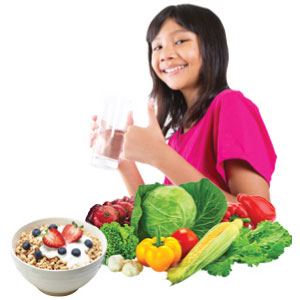Did you know?
Eating disorders among teens (including anorexia, bulimia, and binge eating) are usually associated with teens who are constantly facing a lot of stress due to emotional and physical changes happening in their life and the burden of academic and peer pressures.
Make it a point to encourage a healthy self-esteem and confidence in your child. Remember that no harm will arise by occasionally eating ‘bad’ foods. E.g. having a glass or two of soft drinks on his birthday will not hurt his health in the long run.
A ‘Simple’ Guide to Foods
Here is a list of ‘bad’ foods that you should limit:

- Soft drinks, fruit juices, and other sweetened beverages
- Energy drinks and energy bars
- Breakfast cereals that are high in sugar and low in fibre
- Pastries, cakes, and doughnuts
- Crunchy snacks such as chips or other flavoured treats
- Biscuits, cookies, bread, or crackers made with refined flour
- Canned soups and/or instant noodles
These foods can be taken for occasional treats, but they should not constitute your child’s main diet.
Encourage him to choose most of his foods from the ‘good’ food list:

- Plain drinking water
- Freshly prepared fruit/vegetable juice with no added sugar
- High-fibre foods (e.g whole grains, legumes, fruits, and vegetables)
- Whole grain cereals with little or no added sugar
- Fruits/vegetables as snacks
- Whole grain food products
- Homemade soup with less sugar/salt, accompanied by whole grain noodles
Weight Management
There are three key elements to achieve proper weight management, namely:
Balance
Moderation
Variety
These three key elements can be shortened to the acronym BMV. It highlights the importance of eating foods from different food groups (e.g. carbohydrates, vitamins and minerals, protein and fat) in moderate amounts, that are balanced, and spreading it out throughout the day. It’s also important they eat regular meals, don’t skip meals and don’t overeat.
Practise balance in your daily food selection. Too much or too little are both bad for your diet. Use the food guide pyramid to help you understand how much you need to consume from each group. The key to good health and appropriate weight management is eating regular meals in moderate portions with as much variety and colour as possible. After all, food should be enjoyed, and eating wisely allows you to enjoy your favourite foods and still stay healthy!
Try to make time to eat at least one meal a day with the whole family together and make sure there are no distractions such as TV or any other electronic gadgets.
It should be a time for the family to bond over a meal. This will also provide you with an excellent opportunity to get closer to your child and provide him with any emotional support he may need.
An educational contribution by Malaysian Association for Adolescent Health.







Comments